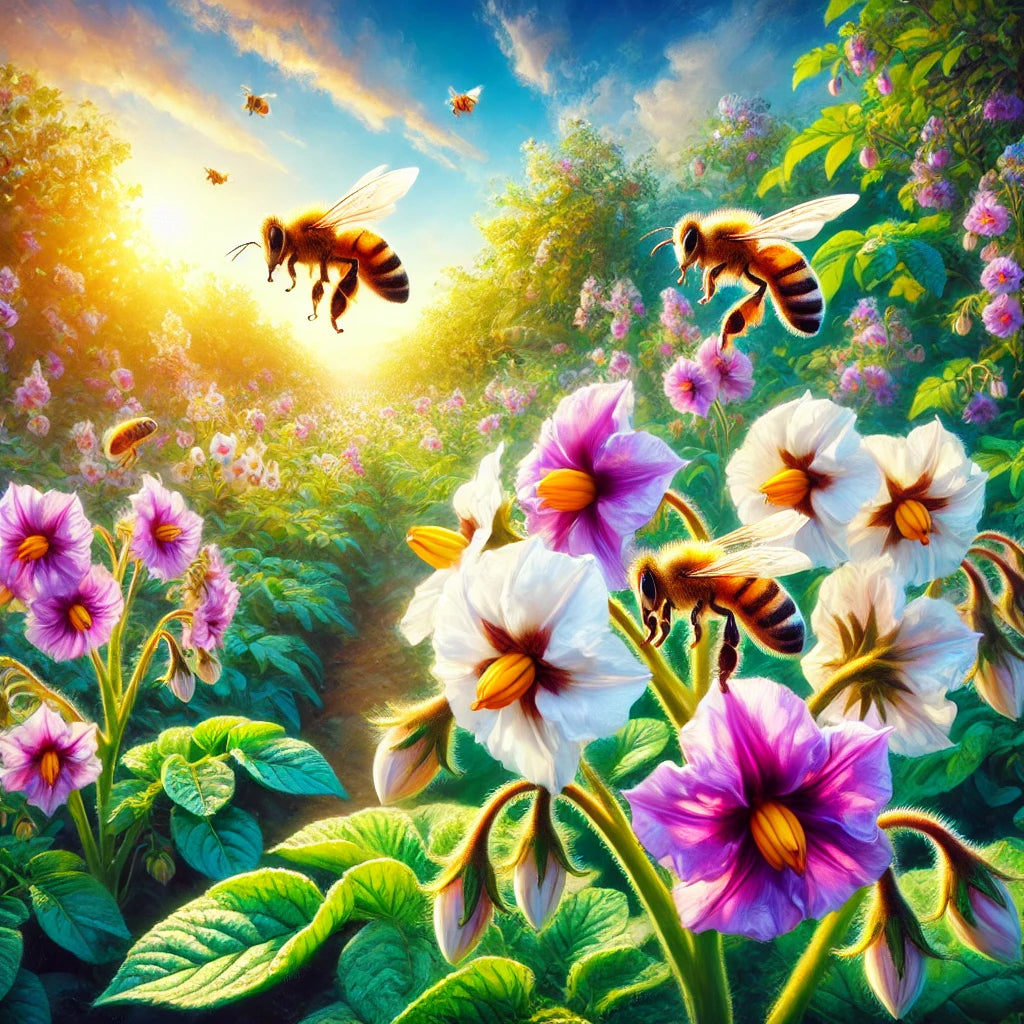Many gardeners ask, “Do potatoes need to be pollinated?” Potatoes are unique in that they don't require pollination for the tubers—the part of the plant we eat—to form.
However, the flowers on a potato plant can still attract pollinators like bees. If pollinated, these flowers produce fruit, but this fruit is not necessary for tuber production.
Potato Flowers and Pollination
While potato flowers can be pollinated, the process doesn’t impact the underground tubers. Tubers form through vegetative reproduction, meaning they grow from the plant’s roots and don’t rely on seeds or flowers to reproduce. That being said, bees play a critical role in the broader ecosystem of a garden by pollinating flowers, which promotes biodiversity.
Potato flowers are self-pollinating, meaning they don’t rely heavily on insects like bees to set fruit. However, bees can still assist by transferring pollen, which can sometimes lead to small fruit or seeds forming. But these seeds are rarely used for growing potatoes.
The Role of Bees in Pollination
Even though potato flowers don’t necessarily need to be pollinated for tuber growth, bees still contribute immensely to the health of a garden. Bees are vital for pollinating many other crops, including fruits and vegetables, that rely on insect pollination to thrive. The benefits of bees extend beyond any single plant, contributing to the success of diverse plants that support a well-rounded garden.
Understanding the life cycle of bees can help you appreciate why fostering a pollinator-friendly environment is important. Even if the potato plant doesn’t directly rely on bees, having them buzz around the garden means other plants will benefit. For beekeepers or those interested in starting a bee farm, creating a habitat that supports bees and encourages pollination is essential.
Maximizing Pollination in Your Garden
To maximize pollination, you should aim to attract as many pollinators as possible, regardless of whether the plants in your garden need it. Planting various flowering plants that bloom at different times can help keep your bees busy all season long. Tools like bee trap attractants can also help guide bees to specific areas in your garden, ensuring that your flowers and other plants get the attention they need.
Consider planting companion flowers around your potato plants that are more attractive to bees. While your potato flowers may not require heavy pollination, having bees around will benefit your garden's overall health.
Support Your Garden with Swarm Commander
While potato flowers don’t need to be pollinated for tubers to grow, fostering a bee-friendly environment is essential for the health of your entire garden. Bees ensure that the other flowers and plants around your potatoes thrive, contributing to biodiversity. As a gardener or beekeeper, understanding the importance of pollination, even for plants like potatoes, will help you create a balanced, flourishing garden.
Enhance your garden’s pollination by visiting Swarm Commander for tools like bee trap attractants and tips on how to start a bee farm. Help your pollinators thrive while boosting your garden’s health!
Frequently Asked Questions About Potato Pollination
Q1. Do potatoes need to be pollinated to grow tubers?
No, potato tubers grow through vegetative reproduction, so pollination is not required for them to form.
Q2. What role do bees play in a pollinator garden?
Bees are essential for pollinating a wide range of flowers, fruits, and vegetables, helping maintain biodiversity and ensuring successful plant reproduction.
Q3. Should I encourage bees in my garden even if I grow potatoes?
Yes! Bees help other plants in your garden thrive, and fostering a pollinator-friendly environment benefits your entire ecosystem.
Q4. How can I attract more bees to my garden?
Plant various flowers that bloom at different times of the year and use tools like bee trap attractants to guide bees to key areas of your garden.
Q5. What are the benefits of having bees in my garden?
Bees support the pollination of plants, leading to better crop yields and a healthier garden ecosystem.



